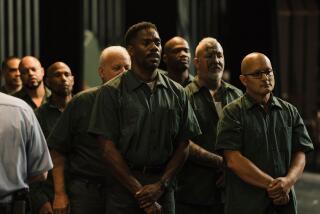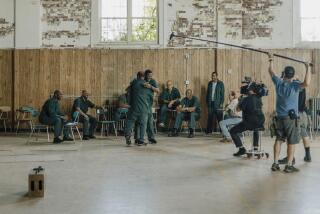Life has its own story line
In an old classroom trailer on the grounds of Camp David Gonzalez detention center, Alex Munoz teaches a handful of youthful offenders the art of making films.
Every year for the last five years, the class of teenagers has produced a number of dramatic scripts and, eventually, short films about the precarious twists and turns of a harsh life on the streets.
But this year, one student’s story was different: Marquise Calhoun’s screenplay focused on death -- his own.
And that story line troubled Munoz, who felt uneasy about encouraging Calhoun to make a film that foretells his own demise.
“Are you sure you want to do this?” Munoz asked. A different ending, he said, might be better.
But Calhoun wasn’t about to alter his story of a young man from South Los Angeles who must make a choice: Do I smoke weed, shoot dice and hang out with homies searching for easy prey? Or take my girlfriend’s advice and find a job and escape to a better place?
“That’s my reality,” Calhoun told his instructor. “A lot of my friends are already dead, and I just may be next.”
Months later, when Calhoun was back in his neighborhood at 75th Street and Broadway, the story of his life came perilously close to following his script.
Crime can be relentless in the shadow of the 77th Street police station, the neighborhood where Calhoun grew up. He was a student at 68th Street Elementary School when his best friend was shot in the head and killed. He was enrolled at Bethune Middle School when he began ditching class, joined a local gang and started selling drugs and getting arrested.
Calhoun attended Locke and Fremont high schools -- and several alternative schools -- before dropping out somewhere in the 11th or 12th grade.
Last year, at 17, he was sentenced to nine months at Camp Gonzalez in Calabasas after robbing a group of Latino men at gunpoint. His take, he said, was about $50 and three cellphones.
He arrived marveling at his own stupidity. He was about to blow nine months of his life, for what? “It just wasn’t worth it,” he said.
The bunks at Camp David Gonzalez are full of tales of wrong choices -- stories of hanging out with hotheads, dropping out of school and stealing cars, packing weapons and selling drugs.
Calhoun stayed out of trouble there, keeping to himself and spending much of his time writing rap lyrics.
But it was lonely. His 18th birthday came and went unnoticed, and that bothered him. Birthdays, he said, were meant to be celebrated at home with family and friends, but Calhoun’s family was not the storybook kind. His mother was always supportive, but his last recollection of his father was on his eighth birthday: His dad failed to show up.
That sense of feeling forgotten is the kind of emotion that Munoz seeks to help young people explore through his program FYI: Films by Youth Inside, which teaches filmmaking to youths in probation camps. Since 2002, Munoz, an award-winning director who holds a master’s degree in filmmaking from USC, has trained more than 60 youths. The program’s annual budget is $15,000, and much of the labor that goes into making the short films is donated. Most of the money comes from private fundraising.
“They usually write about their histories, their families, their girlfriends, the violence in their neighborhoods,” Munoz said. “What we do is challenge [them] to work cooperatively together.”
The class wasn’t an immediate attraction for Calhoun. In fact, he didn’t even sign himself up; an observant guard had quietly added his name to a list of 11 students in the hope that the young man who spent so much time writing lyrics might have other talents.
On his first day of class in February, Munoz asked his students to draw pictures illustrating the themes of their movies-to-be.
“This is like kindergarten,” Calhoun remembered complaining. Nonetheless, he drew a montage, which he titled “South Central Days.” The rough illustration depicted a man with an Afro, an AK-47, a pair of dice and an LAPD helicopter on his right; his girlfriend and a Greyhound bus on his left.
From the drawings, stories would be conceived and scripts written. Films would be staged, professional actors selected and lines memorized. Students would direct under Munoz’s tutelage.
Calhoun had the concept for his screenplay, but the words didn’t flow immediately. He took the idea back to his bed that night, and while others watched television or did push-ups, he started writing.
“I wrote up a little script, added a little to it and a little more about the things going on in my life. Just to keep it real,” he said.
But he didn’t think anything would come of it. He lacked confidence in Munoz; he didn’t believe the director would deliver on his promise to hire black actors for his student film.
That changed the day Tunisia Hardison walked into the camp.
Hardison, a native of Wayne, Mich., who had studied acting at Western Michigan University, was to play Calhoun’s girlfriend, Brianna, in the short film. She was told to dress down -- wear baggy clothes -- for her appearance, and she was nervous until she met Calhoun. He was shy, she realized, and in need of encouragement.
“I said, ‘This is your piece. You wrote this. I’m here to bring your work to life,’ ” she recalled.
“Then he changed and began helping me with the character. He really seemed to come to life.”
Calhoun asked Tunisia to change her earrings and told a male actor who showed up with a mohawk haircut that he had to wear a hat and “talk ghetto,” which, in this case, meant plenty of swearing.
“Calhoun took control of the film,” Munoz said. “We want authentic images. One of the things [the kids] say is they don’t want any fake Hollywood stuff.”
In “South Central Days,” Brianna meets Calhoun on a schoolyard where he is shooting dice and drinking with friends. She persuades him to go home with her and then demands that he change his ways. Calhoun seems to agree with her but goes out one last time with friends to burglarize a house that is supposed to be empty. It isn’t, and in the film, Calhoun is shot and killed by the angry homeowner, who wakes up and discovers the young men in the midst of the crime.
In March, after Calhoun was released from the camp, he finished acting and filming the last scenes of his short film at his house on 75th Street. But then he faded into old routines and started to associate with old friends. Like several others in the film class, he lost contact with Munoz. He was looking for a job but not having much luck.
One hot day in July, on his way to get a haircut, Calhoun was approached by a gang rival and challenged over his neighborhood territory. They started to fight and the other man pulled a gun and shot Calhoun twice, striking his wrist and hip.
“I was gasping on the ground,” Calhoun recalled. “I could see people walking past me. I’m shot and people are walking past me? Why couldn’t they call the police?
“But they just kept walking.”
From the ground, Calhoun watched the gunman run past and wondered if the next sensation he felt would be a shot finishing him off.
But the gunman kept on running, and at that moment, Marquise Calhoun decided this life had to change.
“Somewhere I found the strength to get up,” he said. “I limped to the middle of the street. A police car came by. I said, ‘I just got shot.’ ”
Someone called an ambulance, and Calhoun was sped to the hospital.
“It was a wake-up call for me,” he said. “The man upstairs was saying, ‘Calm down. you’re moving too fast.’ ”
Munoz said, “That’s when he called me. He told me, ‘I got shot, just like in my movie. I want to make some changes for the better.’ ”
Munoz had not forgotten how Calhoun thanked him after the completion of “South Central Days”:
“I really want you to know what it meant to me at the camp,” he told his director. “I thought that no one would show up on my day [his movie was filmed]. This is one of the best days of my life.”
After Calhoun was released from the hospital, Munoz hired his former student to work for a couple of days on a music video. Then he got a job at the Post Office, sorting mail. Calhoun asked Munoz if there was work he could do on other films.
Calhoun celebrated his 19th birthday at Munoz’s Inglewood apartment and studio, making a new film about gang life.
In October, Munoz took Calhoun and some FYI volunteers to a fundraiser and student-film screening at the Brentwood home of two important FYI supporters: Carol Biondi, a longtime children’s advocate, and her husband, Frank Biondi, who used to run Universal Studios and Viacom.
Calhoun spoke to the audience about making his film and thanked them for their support; attendees contributed $100,000 to FYI.
“There are kids who say, ‘I want to turn my life around now,’ ” said Carol Biondi, a member of the L.A. County Commission for Children and Families and the state Advisory Committee on Juvenile Justice and Delinquency Prevention. “These kids are motivated to take advantage of the help because they don’t want to be back in detention.”
Programs like FYI, she said, go a long way toward helping them heal.
But Munoz added a word of caution: The steps toward healing are “baby steps,” he said. “There can be a faulty notion of overnight success. It takes a while. It’s not easy.”
For Calhoun, the next chapters of his life have options.
“I have choices, I can be from somewhere,” he said. “I have to do something for myself, save my family, but I have to find a way to do something positive.”
--
To watch “South Central Days,” go to www.fyifilms.org/FYI%20Films.html.
More to Read
Only good movies
Get the Indie Focus newsletter, Mark Olsen's weekly guide to the world of cinema.
You may occasionally receive promotional content from the Los Angeles Times.







